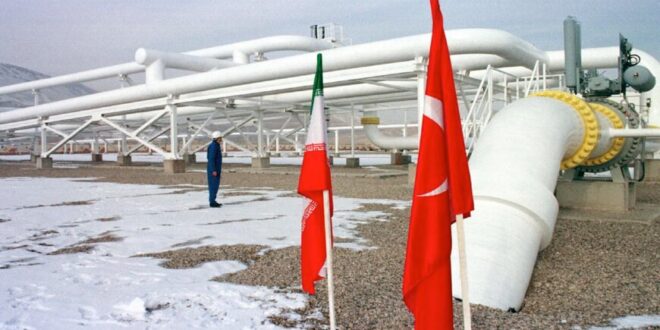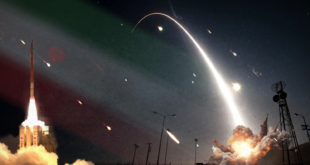Ankara’s energy preparedness for the winter and its capacity to secure alternative supplies have come under question after a halt in the gas flow from Iran sparked an unprecedented energy crunch in the country.
The disruption of Iranian gas supplies to Turkey, blamed on a technical hitch in the pipeline between the two neighbors, has turned into an energy crisis for many industrial enterprises across the country, putting Ankara’s contingency plans and risk management capacity under the spotlight.
After Iran cut the flow Jan. 20, Turkey’s state pipeline operator BOTAS slashed gas supplies to industrial zones by 40%. Supplies to gas-fueled power plants were then halted, followed by a decision to cut electricity supplies to industrial zones for three days. BOTAS announced Jan. 28 that the flow of Iranian gas had resumed in small amounts as a test run and the cut for industrial consumers was reduced to 20% as of Jan. 31. The energy crunch hit production at hundreds of enterprises at a time when Turkey’s industry is already grappling with economic turmoil and skyrocketing gas and electricity prices, raising questions over Ankara’s energy ties with Tehran and its energy policies.
With a gas consumption of up to 60 billion cubic meters per year, Turkey is a major market for gas suppliers. Gas is used widely for household heating and industrial production as well as for 40% of power generation in the country. Iranian supplies account for up to 10% of Turkey’s consumption. In 2020, for instance, Turkey consumed some 48 billion cubic meters of gas, with Iran supplying 5.3 billion cubic meters.
Unlike Russian and Azeri gas supplies, the pipeline with Iran has seen temporary disruptions ever since it became operational in 2001. Increased domestic consumption in Iran due to harsh weather has often been blamed for drops or halts in the flow to Turkey.
Nevertheless, Iran has been supplying Turkey with gas for more than two decades now despite frequent political differences between the two countries. As such, the gas trade has demonstrated its willingness to keep energy ties separate from regional and global politics.
For Turkey, gas imports from Iran serve the purpose of diversification and reduce reliance on Russia, which is the country’s largest supplier, providing 33% of its gas imports. In addition to gas pipelines with Iran, Russia and Azerbaijan, Turkey buys liquefied natural gas (LNG) under long-term contracts with Algeria and Nigeria as well as from US and Egyptian suppliers on the spot market to meet short-term needs. And while Iranian gas is more expensive than Russian gas, it is still cheaper than the Azeri gas that Turkey receives through the Trans-Anatolian Natural Gas Pipeline inaugurated in 2018.
Some have speculated that the disruption of Iranian supplies stemmed from Turkey’s unpaid bills — a claim that Turkish Energy Minister Fatih Donmez categorically denied. A senior BOTAS official confirmed to Al-Monitor that Turkey owed no money to Iran or any other of its gas suppliers. Moreover, Tehran would have said it openly if a debt issue was at stake, as no supplier would take the blame for a buyer’s problem and risk reputational harm as an unreliable market player. In December 2020, for instance, Tehran slashed gas supplies to Iraq over unpaid bills and resumed the normal flow several days later after reaching an agreement with Baghdad on how the debt would be repaid.
Others have claimed that halting Turkey’s gas might be Tehran’s way of responding to recent signs of fence-mending between Turkey and Israel. President Recep Tayyip Erdogan said last week that his Israeli counterpart, Isaac Herzog, would pay a visit to Turkey in the first half of February, which could herald a “new chapter” in bilateral ties. Energy cooperation is expected to be high on the agenda of the visit. Erdogan has said his government is ready for pipeline talks with Israel, arguing that Turkey is the only viable route for Israeli gas sales to Europe.
Yet the argument that Turkish-Israeli reconciliation could bear on Turkey’s energy ties with Iran does not seem to stack up for several reasons. First, Iran maintained the gas flow to Turkey in the years when Ankara was on good terms with Israel before the relationship gradually deteriorated and plunged into crisis in 2010. Second, gas exportation is a major source of hard currency for Iran as it reels from international sanctions curbing its financial means. Thus, buyers like Turkey and Iraq are important for Iran. It may well be irked by the prospect of Turkish-Israeli reconciliation, but it would be shooting itself in the foot by cutting Turkey’s gas at the expense of jeopardizing its credibility as a supplier and losing hard-currency revenues. Lastly, the world is no stranger to suppliers weaponizing energy, but there is no evidence to suggest that Iran is trying to use the gas for political blackmail.
In sum, Iran’s halt of the gas appears similar to temporary stoppages in the past, sparked by an increase in Iran’s domestic consumption due to cold weather. The essential problem for Iran stems from its low production capacity, even though it has the second-largest gas reserves after Russia. According to S&P Global Platts, which provides analytics for the energy market, Iran’s daily gas production has stood at 800 million cubic meters recently. Yet most of it has gone to domestic consumption, including household heating and power generation. Some 80% of Iran’s electricity production relies on gas. The Iranian domestic market consumed up to 750 million cubic meters of gas per day in January, leading the country’s oil minister to appeal to the populace to dress warmly and reduce gas consumption.
On the Turkish side, the Iranian cut has meant a supply drop of about 20 million cubic meters per day, which turned into a crisis largely because Ankara was caught unprepared for winter contingencies.
BOTAS says it had sought to fill its two underground storage units ahead of the winter as Ankara negotiated with suppliers, including Russia and Azerbaijan, to renew contracts expiring this year. According to the company, the storage unit in Aksaray province in central Turkey contained 1.2 billion cubic meters of gas at the turn of the year, but a rise in demand led it to tap on that gas. The same goes for the other storage facility in Silivri near Istanbul. Turkey reportedly had 1.2 billion cubic meters of gas in storage as of Jan. 18, 42% less than a year earlier.
The spike of spot prices for LNG and the high gas demand of power plants during the summer might be the reason for the lower storage levels this year, according to Gokhan Yardim, a former BOTAS director-general. “They might have waited for the prices to drop,” he said in a newspaper interview last week.
The severe depreciation of the Turkish lira, which lost about 40% of its value last year, has only added to the surging cost of Turkey’s gas imports.
For many energy pundits, Turkey’s unpreparedness rather than the Iranian stoppage remains the real issue. Iran’s temporary cuts are not something new, they argue, but Ankara has failed to take adequate measures despite expectations of harsh weather and tougher market conditions due to price increases. To overcome the crisis, Turkey has asked for additional gas supplies from Azerbaijan.
In sum, Turkey may have struck some balance in terms of supply diversification, but its failure to draw up an alternative supply chain or negotiate contingency deals with suppliers has led the Iranian stoppage to grow into a crisis. Without prompt measures, a similar disruption might cause a similar crisis down the road. While Turkey’s energy ties with Iran will continue, it has a big lesson to learn from this episode.
 Eurasia Press & News
Eurasia Press & News




